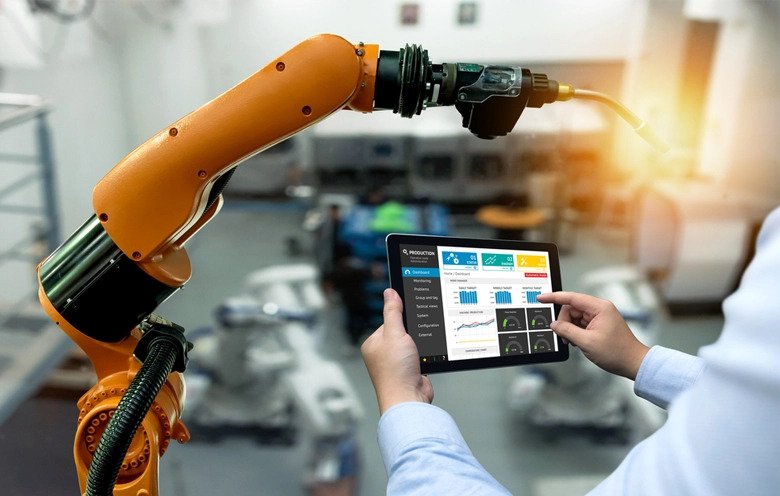Digital transformation (DT) is a broad business strategy applicable across various industries to solve traditional business challenges and create new growth opportunities using digital technologies. In particular, the adoption of digital transformation in the manufacturing industry is changing the way manufacturers carry out business operations. It helps industrial enterprises to maximize revenue, reduce costs, improve quality and increase flexibility.
In this post, we will discuss –
- What challenges do manufacturers face without DT?
- Which technologies can digitally disrupt your manufacturing processes?
- What value does DT bring to manufacturers?
- How can we help you to implement DT to align your manufacturing processes?
If you don’t adopt relevant digital technologies, you may lose business to your competitors. The use cases of digital transformation in manufacturing facilities range from asset optimization to workforce productivity and industrialization to automation. Therefore, it is crucial to plan a digital transformation roadmap for your manufacturing organization to deploy digital technologies effectively.
What are the challenges of the manufacturing industry?
Let us look at the key challenges the manufacturing industry faces and needs your attention.
Data silos – One of the most common barriers to digital transformation in the manufacturing sector is data silos. To make data-driven decisions, your organization must have a 360-degree view of collected data. If data is available only in silos, it hinders leaders in quick and accurate decision-making. Hence, companies need an automated process of collecting and sharing data to gain a competitive advantage and build strong customer relationships.
Manual tasks and human errors – While your factory may have automatic control systems, certain tasks require human intervention. Also, while performing these manual tasks, there are chances of human error. Moreover, they affect organizations facing the most common risks, from safety and quality to cybersecurity risks.
Poor quality management – Manufacturers often struggle to maintain a cohesive quality system that works on both the shop floor and in the office. From paperwork to quality control checks to audits – maintaining excellent product quality requires robust quality management. Unplanned downtime, breakdowns, minor stops, speed loss and production rejects are some quality management issues in manufacturing.
Missing skills – Digitally complex devices and sophisticated platforms need overhauled skills and knowledge. Therefore, companies should invest in IT and process knowledge training for the existing staff, new team members and experts in the field.
Training may involve:
- Automated operations
- Cloud-based resource planning
- Flexible production line configurations
Existing legacy systems – Legacy systems are a challenge for many manufacturing operations as they lack modern infrastructure and data security. The legacy systems do not support IoT device communication, ERP system integration, data management and more because earlier digital concepts did not exist. Hence, such traditional systems are impossible to integrate with modern technologies. Such scenarios hinder factory floor efficiency, give unclear visibility from production to procurement and do not support faster decision-making.
Some advanced technologies enabling industrial digital transformation
Implementing trending digital technologies in your manufacturing plant can accelerate the digital transformation journey of your factory while streamlining manufacturing operations and product development models.
- Artificial intelligence (AI) and machine learning (ML)
- Cognitive computing
- Data visualization
- Cloud computing
- Connected worker
- Edge internet of things (IoT)
- Immersive experience – MR, AR, VR
- Additive Manufacturing (3D printing)
How does DT drive value for manufacturers
Digital operations
The future of manufacturing relies on digital operations that enable manufacturing facilities to run, learn, adapt and thrive. Digitize your business operations for a more engaging customer experience and innovative business models through disruptive technologies and data.
Digital transformation in manufacturing eliminates the need for paper and creates a decision support system. By leveraging software-based electronic systems, you can monitor and control manufacturing production processes while capturing all the information on production records.
Vision monitoring
From supporting safety and efficiency to improving product quality, real-time visibility is essential for continuous improvement in production and manufacturing. A vision-guided system integrated with computer vision API can improve manufacturing operations across the floor. This real-time AI machine vision enables –
- Enhance worker safety
- Increase uptime
- Geo-fencing
- Product and component assembly inspection
- Predictive and preventive maintenance
- Provide alerts of potential hazards to the worker
- Avoid repetitive injury
Industrial IoT sensors
IoT devices like sensors, actuators, chips and more make a factory infrastructure smarter. Industrial IoT allows modern manufacturers to capture, record, exchange and analyze crucial information about production assets and other resources. Implementing IoT-enabled systems can manage unforeseen production challenges while transforming your manufacturing processes, such as –
- Asset tracking
- Facility management
- Machine utilization
- Predictive maintenance
- Connecting remote assets
- Process and behavior monitoring
Work order management
Traditional paper-based order management processes are laden with poor traceability and visibility while imposing several other risks. Besides, mistakes can occur anywhere in the process – manufacturing, packaging, picking and shipping. You may also fail to meet customer expectations due to another unforeseeable factor.
With digital transformation, you can automate and streamline the mundane process of order receiving, tracking and fulfilment. Moreover, you can track orders and returns as a KPI to get insights into error-prone areas. It will also help to revise processes and implement additional training.
Digitizing work order management provides –
- Automated work orders and their modifications
- Up-to-date status information
- Accurate reporting system
- Easy access to tracking systems via mobile devices
Quality inspection automation
Manual inspections are generally lacking and unreliable. Manufacturers know that they cannot undervalue the importance of quality. To meet the growing demand for quality products, they need to elevate quality assurance by digitally transforming their quality management.
Implementing digital technologies can help to connect data and operators to fine-tune processes for maximum results. Quality compliance and automated real-time monitoring keep the quality checked and alert if concerns arise. With automation, you can –
- Eliminate paper inspection forms
- Overhaul inspection processes
- Decrease total quality control costs
- Improve quality traceability
- Update checklists automatically
- Identify defects automatically
- Exchange data with the existing systems
Digital tracking of workflows and inventories
Automated manufacturing operations include supply chain management, so digitization in the procurement process is crucial. Given the complexity of workflows in manufacturing companies, managing and orchestrating inventory becomes a bottleneck.
Real-time inventory tracking prevents customers from purchasing sold-out products, which reduces customer support costs. With digital transformation, you can track inventory in real time to keep customers happy and avoid excess inventory and stock-out situations.
- Accurate stock information in real-time
- Palletization, packaging, and sorting
- Heavy equipment cleaning
- Product labeling and tracking
- Warehouse monitoring for restocking
- Track your shipments and inter-warehouse movements
- Capture real-time feeds logistics fleets
A journey toward digital maturity!
Digital transformation in manufacturing unlocks various opportunities, including business efficiency, agility and automation. Creating a manufacturing digital transformation roadmap is a process of remaining competitive.
At Softweb Solutions, we provide end-to-end support to strategize, implement, sustain and innovate your manufacturing operations. Our experts will evaluate your factory’s environment and offer digital transformation consulting services to bring tangible business value. Our digital transformation services can enhance your manufacturing efficiency, asset optimization, O&M cost reduction and operational risk reduction.
Contact our team if you are planning to embrace the digital concept to enter new markets and increase ROI.









